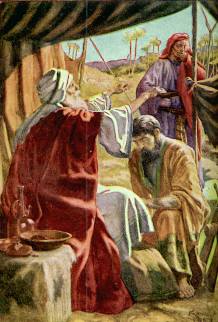 Wednesday I mentioned that Jacob and Esau were brothers, and that Esau sold his birthright to Jacob (for practically nothing), and I pointed out that some people think that Jacob took advantage of Esau, but that I believed that it was of God. I also said that was another subject, for another blog. This would be that blog.
Wednesday I mentioned that Jacob and Esau were brothers, and that Esau sold his birthright to Jacob (for practically nothing), and I pointed out that some people think that Jacob took advantage of Esau, but that I believed that it was of God. I also said that was another subject, for another blog. This would be that blog.If you go back to the very beginning, before Jacob and Esau were even born (they were twins, by the way), in Genesis 25:23, God told Rebekah that there were two nations in her womb, but that one would be stronger than the other, and the elder would serve the younger. I think that shows that God already had plans for Jacob, before he was even born. When Jacob and Esau were born, Esau came out first, but Jacob was holding onto his heel (Genesis 25:26). The name, Jacob, actually means, heel-holder, which I understand was a common expression for a trickster. Of course, Jacob wasn’t named that because he was a trickster, but because of the manner in which he was born.
Not very much farther into it, in verse 31, we find where Jacob asked Esau to sell his birthright. Esau, of course, does, but all of this was done without their father’s knowledge. So, when it came time to collect the birthright (or, at least, that’s what Isaac thought), Rebekah helped Jacob disguise himself as his brother (Genesis 27:5), so that he could collect the birthright that Esau had sold to him. Verse 12 indicates that, at the very least, Jacob was reluctant to go through with this, but Rebekah insisted, and it all worked out. How often, in Scripture, do people get rewarded for trickery?
It’s interesting, too, that Esau wanted Jacob dead, when he realized what he had lost. Jacob went, and sojourned with Laban, and married Laban’s daughters, and stayed away for twenty years. During that time, Laban tried to take advantage of Jacob, but in the end, God prevailed for Jacob, and Jacob left Laban as a man of considerable substance. When he came back home, Esau was actually glad to see him (Genesis 33:1-4).
It’s been said that familiarity breeds contempt. I think most of us (if not all of us) who grew up with siblings know that at least some of the time when we were growing up, we either wished to have been an only child, or wished death upon our siblings. It certainly seems, at best, cold-hearted for Jacob to charge his brother for a little bit of food when Esau was faint with hunger. Somehow, though, after growing up, moving apart, spending time away from each other, we find that we miss them. This is especially true, I think, for those of us who have lost a sibling. It seems fairly evident that, when Esau thought Jacob was gone forever, that he began to miss him, and long for him. I suspect that twenty years is a long time for God to help one get over one’s grudges (although it’s also more enough time to become very bitter if one nurses those grudges). After twenty years, he not only didn’t want him dead, he was very happy to see him, alive and well, and prosperous. Esau apparently had learned to look back at the incident as just a moment of childish foolishness. One of the things that struck me about this was that soon after that, Isaac died. Think about that for a minute: Isaac went to bless Esau, to give him his birthright, because Isaac thought he was at death’s door, but Isaac ended up living at least another twenty years.
Much, much later, God spoke to Malachi, and told Malachi that He loved Jacob, and hated Esau (Malachi 3:1-3). God clearly didn’t love Esau the way that He loved Jacob. Does God love tricksters? I realize that tricksters are not explicitly mentioned in Revelation 21:8, but I’m pretty sure that they would fall into that category somewhere. God must have led Jacob to do what he did, or God would have taken care of it.









No comments:
Post a Comment